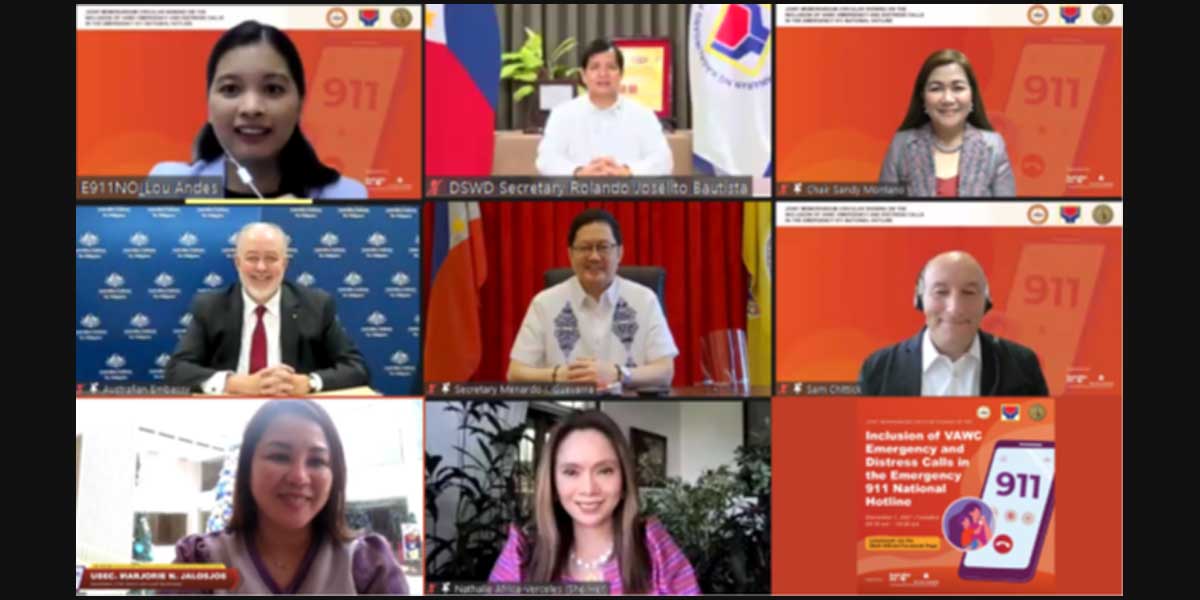
The Department of the Interior and Local Government, Department of Justice, and the Department of Social Welfare and Development sign the Joint Memorandum Circular (JMC) on the inclusion of Gender-based Violence (GBV) Emergency and Distress Calls in the Emergency 911 National Hotline in a virtual ceremony held on December 7, 2021, in time for the 2021 18-Day Campaign to End Violence Against Women (VAW).
The Circular lays down the guidelines for 911 Emergency Telecommunicators in handling GBV cases and aids the service providers in properly responding to calls and providing immediate referral to relevant agencies or organizations.
The JMC is a fruit of the series of training and collaborations which trace back to the memorandum of understanding of the Philippine Commission on Women, the Asia Foundation, and the Emergency 911 National Office adopting a Pocket Guide to be used in taking distress calls related to VAW and GBV.
Prior to this program, calls coursed through the 911 hotline usually include reports about fire, police, medical, and search and rescue assistance.
The Inter-Agency Council on Violence Against Women and Children (IACVAWC) also issued a Council resolution to endorse the JMC and encourage all government agencies and local government units (LGUs) to provide technical support and charge related activities to their GAD budget.
PCW Chairperson Sandra Sanchez-Montano, in her opening message, expressed hope that through this program, GBV and VAW survivors will have a safety net which is easy to reach, free of charge, and available 24/7.
The JMC, which covers all agencies comprising the Emergency 911 Response System, member agencies of the IACVAWC, and local governments units, aims to utilize and enhance already existing referral and response pathways.
Speaking for the Department of the Interior and Local Government, Undersecretary for Mindanao Affairs and Special Concerns Marjorie Jalosjos noted the significance of the program in providing a holistic and adequate approach in GBV response.
“This is crucial in addressing the challenge in connecting the VAW victim to proper response and referral pathways so that they can be supported by appropriate government agencies as soon as possible given the nature of their situation and environment,” Usec. Jalosjos said.
The JMC also enjoins service providers to give psychological first-aid responses to survivors who must always be treated with respect and dignity to avoid causing further trauma or stigma.
Secretary Rolando Joselito Bautista of the Department of Social Welfare and Development committed to ensuring efficient psychosocial services for 911 callers and other GBV survivors.
“The Department also pledges to help all women and children who experienced gender-based violence by providing them with social protection, services, and interventions to assist them towards their healing,” Secretary Bautista vowed.
The agencies, in partnership with the Asia Foundation and the UP Center for Women and Gender Studies, trained emergency telecommunicators in using a gender-sensitive and survivor-centered
approach in receiving GBV calls.
Telecommunicators gained knowledge on VAW, GBV-related laws, sexual orientation, gender identity, gender expression and sex characteristics, and principles of survivor-centered care.
With all these in place, Justice Secretary Menardo Guevarra is optimistic that GBV survivors will have the courage to seek help.
“We are one with giving the public a functional, effective, and reliable response referral system for intervention that will help ease reporting, expedite investigation, and provide instant response and information on VAWC and other gender-based violence and ultimately ending the culture of silence surrounding abuse and violence,” Secretary Guevarra said.
What to expect when calling 911
Survivors or their family, friends, or witnesses can call the 911 National Hotline through their landline or mobile phone. A 911 Emergency Telecommunicator will receive the call, get personal details which will be protected and will remain confidential.
The receiver provides psychological first-aid and asks questions to ascertain the appropriate service provider needed by the client.
The next steps will then depend on the situation of the victim. If she or he needs immediate action, the responder will coordinate with the nearest police station and will transfer the
call to the same for direct and quick action.
If no immediate emergency assistance is necessary, the responder identifies, through a survivor-centered conversation with the client, the appropriate assistance or services to be provided and connects the client to the relevant agency.
The services for GBV emergencies include, but are not limited to rescue operations, law enforcement services, legal and paralegal assistance services, social services, medical services, and others.
Referral to more or other agencies can also be taken until the case is fully resolved and until the client is informed of the options available and the next steps she or he can take.
Ending VAW, one call at a time
The need to include VAW calls in the 911 National Hotline is rooted in the prevalence of this social problem.
The 2017 National Demographic Health Survey (NDHS) released by the Philippine Statistics Authority (PSA), showed that 1 in 4 Filipino women, aged 15-49, has experienced physical, emotional
or sexual violence from their husband or partner.
Since the onset of COVID-19 quarantine restrictions in March 2020 to August 2021, a total of 18,945 VAW cases have been reported to the PNP Women and Children Protection Center.
Sam Chittick, The Asia Foundation Country Representative in the Philippines, said that indeed, one incident of Violence Against Women is too many, especially during this health crisis.
“We also know that many of the victims live in close proximity to their abusers and perpetrators and the COVID-19 pandemic meant there has been limited mobility and more limited opportunities to reach out. But we’ve seen examples that positive steps can be taken and I think today is a wonderful example of collaborative work from a number of agencies and from a number of people who care to really try to make a difference,” Chittick shared.
The agencies and partners also highlighted that concerned family, friends, and witnesses can report through 911.
“An option that is systematic, holistic, and sensitive will encourage survivors to talk to someone and ask for assistance. Family members and friends of survivors can also encourage them to use the hotline or utilize it on their behalf,” said Dr. Nathalie Africa-Verceles of the University of the Philippines Center for Women and Gender Studies.
Australian Ambassador to the Philippines Steven J. Robinson commended the move, saying “The Philippines has long been a model for innovative and inclusive programs that advance the interests and welfare of women and children.”




















